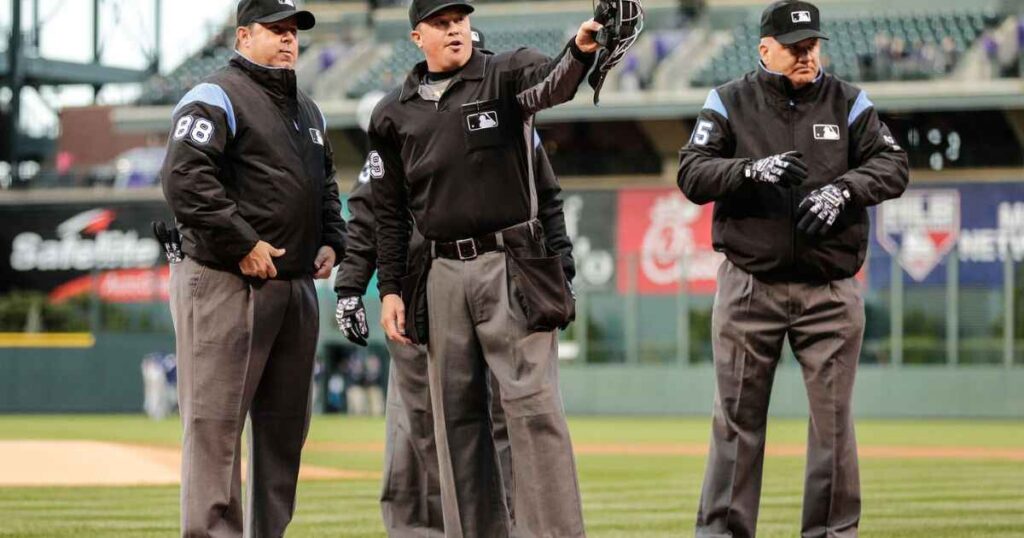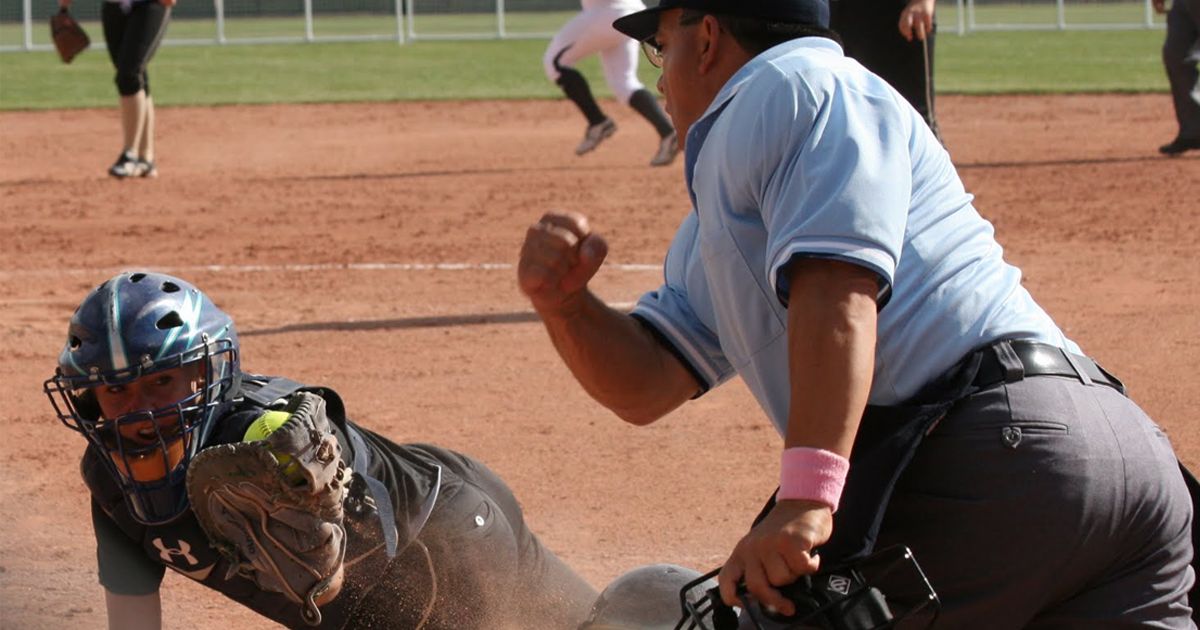Becoming a softball umpire is an exciting venture for individuals who are passionate about the sport and wish to be an integral part of the game. As an umpire, you play a crucial role in ensuring fair play and maintaining order on the field.
Are you a dedicated softball enthusiast with a passion for the game? Becoming a softball umpire might be the perfect path for you. From the thrill of officiating games to the satisfaction of ensuring fair play, this journey offers a unique and rewarding experience.Don’t miss out on the opportunity to be a crucial part of the game you adore.
Softball umpires are the unsung heroes of the game, responsible for ensuring that matches run smoothly, players adhere to the rules, and fair play prevails. This article will guide you through the steps to become a softball umpire, covering everything from the initial requirements to advancing in your umpiring career. Stay with us..
How to become an umpire for youth softball?
Becoming an umpire for youth softball is a fantastic way to get involved in the sport, mentor young athletes, and ensure that the game is played fairly and with sportsmanship. To embark on this rewarding journey, you’ll need to meet certain prerequisites.
Most youth softball organizations and leagues require potential umpires to be at least 18 years old, ensuring a level of maturity and understanding of the game. While prior experience as a player or coach can be beneficial, it’s not always necessary. Your enthusiasm for softball and a willingness to learn are often more important.
Requirements and Qualifications
To begin your journey as a softball umpire, you’ll need to meet certain requirements. The minimum age for most associations is 18 years old. You should also have a good understanding of the game and its rules. Enthusiasm and passion for softball are essential, as they will drive your commitment to the role.
Understanding the Rules and Regulations
One of the key responsibilities of an umpire is to enforce the rules of the game. To do this effectively, you must have an in-depth knowledge of softball rules and regulations. You can start by reading the official rulebook and familiarizing yourself with the various situations that may arise during a game.
Training and Certification
The next step in your journey is to join a local umpire association. These organizations provide training, mentorship, and opportunities to officiate games. You can typically find information about local associations through your regional softball governing body.
Completing the Necessary Training
Umpire training programs are designed to teach you the intricacies of officiating softball games. This includes learning about fair and foul calls, base and field responsibilities, and how to handle challenging situations. Training programs are generally conducted by experienced umpires who share their knowledge and expertise.
Softball Umpire Certification
Certifications demonstrate your competency as an umpire. Depending on your location and the level of games you want to officiate, you may need to earn various certifications. These certifications are typically obtained by passing written exams and field evaluations.
Gaining Experience
As you progress through the initial stages of your journey as a softball umpire, gaining practical experience becomes a pivotal part of your development. To truly master the art of officiating, you’ll typically start by umpiring lower-level games, such as youth or recreational leagues.
These games offer a valuable training ground where you can apply the knowledge and skills you’ve acquired during your training and certification process. It’s on these fields that you’ll learn to make real-time calls, handle different game situations, and gain a deeper understanding of the nuances of softball officiating.
Essential Equipment for Softball Umpires
When you step onto the field as a softball umpire, having the right equipment is crucial for your comfort, safety, and effectiveness. The equipment you use not only ensures that you can make accurate calls but also protects you from potential risks.
Key items in your arsenal include a mask, chest protector, shin guards, indicator, plate brush, and a uniform. The softball players wear mask shields your face from foul tips, the chest protector guards against impacts from stray balls, and shin guards protect your legs. An indicator is your tool for keeping track of balls, strikes, and outs, and the plate brush helps maintain a clean pitcher’s plate.
Uniform and Appearance Guidelines

Maintaining a professional appearance is a fundamental aspect of being a softball umpire. When you step onto the field, you represent the integrity of the game, and your attire should reflect that responsibility.
Softball umpires are typically required to wear an official uniform, which often consists of a specific shirt, pants, cap, and protective gear. It’s not just about looking the part; it’s about being easily identifiable and commanding respect.
A clean and well-maintained uniform not only enhances your credibility but also sets a positive example for players, coaches, and spectators. Beyond the uniform, personal hygiene is equally important. Umpires are expected to arrive on the field looking neat and professional.
Your appearance, combined with your knowledge of the game and your ability to make fair decisions, contributes to a seamless and enjoyable softball experience for everyone involved.
Game-Day Preparation
Before stepping onto the field, umpires have a set of pre-game routines and rituals that help them mentally and physically prepare for the challenges ahead. Stretching and warm-up exercises are common practices to ensure physical readiness.
Umpires also engage in visualization techniques to sharpen their decision-making abilities and to mentally rehearse successful calls. Beyond these personal rituals, reviewing key rules is essential to maintain a strong command of the game’s regulations.
Umpires must develop the ability to handle pressure and stress effectively, as they often find themselves making split-second decisions in high-stakes situations. Game-day preparation, in essence, is a blend of physical and mental readiness, which enables umpires to perform at their best and uphold the integrity of the game.
Communicating with Players and Coaches
Effective communication is a cornerstone of a softball umpire’s role. When officiating games, you’ll find yourself in situations that require clear and respectful interaction with players, coaches, and sometimes, passionate spectators.
Your ability to convey decisions and explain them, when necessary, is paramount to maintaining order on the field. You’ll need to strike a balance between assertiveness and approachability, ensuring that your calls are understood and accepted by all involved.
Building good rapport with players and coaches can go a long way in creating a positive and cooperative atmosphere during games. Remember, your communication skills are not just about enforcing the rules; they’re also about fostering a sense of sportsmanship and fair play.
Advancing Your Umpiring CareeR
Once you’ve gained experience and confidence in lower-level games, the natural progression is to set your sights on higher levels of play. This section will delve into the steps you can take to elevate your umpiring career to new heights.
It involves seeking out more significant opportunities, such as officiating in college or even professional leagues. Advancing your career often requires additional training, certifications, and the ability to consistently make accurate calls under high-pressure situations.
It’s a challenging yet immensely rewarding phase that allows you to grow, learn, and become a respected figure in the world of softball officiating. So, if you’re eager to take your umpiring journey to the next level, read on to discover the steps to reach the pinnacle of your umpiring career.
USSSA Umpire
The title “USSSA Umpire” signifies an important role in the world of softball. USSSA, which stands for the United States Specialty Sports Association, is a prominent governing body for various sports, including softball.
As a USSSA umpire, your responsibilities go beyond the standard umpiring duties. You become an integral part of a nationally recognized organization, officiating games and tournaments sanctioned by USSSA.
This title represents your commitment to upholding the highest standards of the sport, enforcing USSSA rules, and contributing to the integrity of softball competitions at a broader level. Becoming a USSSA umpire is a significant step in your umpiring career, opening doors to exciting opportunities and experiences within the softball community.
Frequently Asked Questions
How much can I earn as a softball umpire?
Umpire earnings vary based on the level of games officiated. Local and youth league umpires typically earn less than those officiating at higher levels.
Are there any age restrictions for becoming a softball umpire?
Most associations require umpires to be at least 18 years old, but some may have different age requirements.
What should I do if I make a controversial call during a game?
Controversial calls are part of the job. It’s essential to remain calm and confident in your decisions. If necessary, consult with your fellow umpires to reach a consensus.
How can I improve my knowledge of softball rules and regulations?
Reading the official rulebook, attending training programs, and seeking guidance from experienced umpires are great ways to enhance your understanding of the rules.
Can I umpire softball games part-time or as a hobby?
Yes, many umpires officiate games part-time or as a hobby. You can choose your level of involvement based on your availability and interest.
Conclusion
In conclusion, becoming a softball umpire is a fulfilling journey for those who have a deep passion for the sport. It requires dedication, continuous learning, and the ability to handle pressure, but the rewards are significant. As you progress through the ranks and officiate games at various levels, you’ll find immense satisfaction in being a vital part of the softball community.








